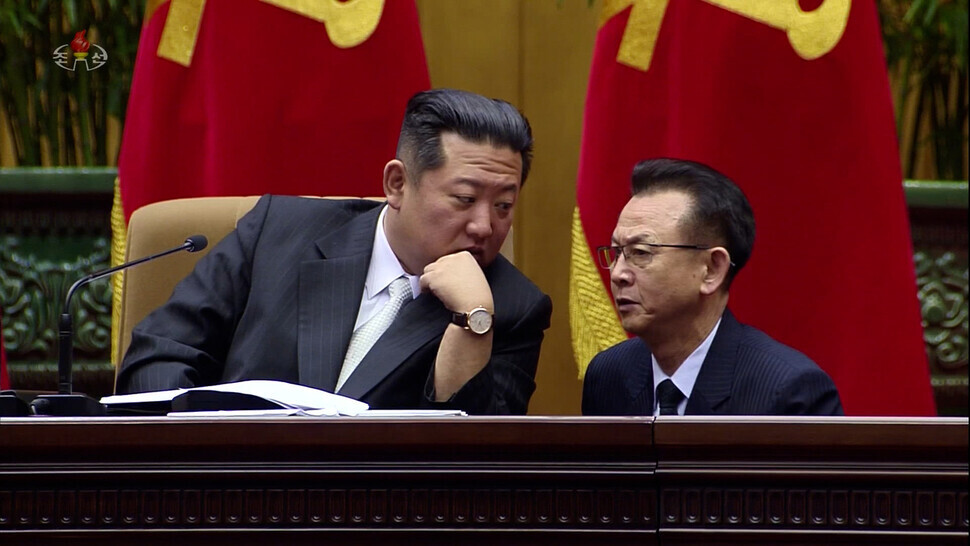hankyoreh
Links to other country sites 다른 나라 사이트 링크
Three educated guesses as to what Kim Jong-un is thinking while watching Putin

What might North Korean leader Kim Jong-un think of Russia’s armed aggression against Ukraine and the subsequent anti-Russian sanctions imposed by the US and the European Union?
According to reporting by North Korea’s Rodong Sinmun on Tuesday, in his speech at a conference of secretaries of committees of the Workers’ Party of Korea (WPK), Kim made no mention of the crisis in Ukraine. But there are other clues indicating his inner workings: Sunday’s ballistic missile launch, which North Korea argued was “an important test following the schedule for the development of reconnaissance satellites”; and a Korea Central News Agency report quoting the North’s Foreign Ministry spokesperson as saying, “the root cause of the Ukraine crisis totally lies in the hegemonic policy of the U.S. and the West.”
There are at least three ways that Kim’s inner thought process might be unfolding.
First, Kim may obsess over North Korea’s nuclear capabilities even more. Like Saddam Hussein of Iraq and Muammar Gaddafi of Libya, who both were ousted from power and executed after giving up their nuclear weapons, Ukraine is currently being infringed upon by Russia’s military after previously returning Soviet nuclear weapons and having been assured of its sovereignty and territorial integrity through the Budapest Memorandum of 1994 may offer an important lesson for Kim.
This isn’t to say the door to a denuclearized Korean Peninsula has completely closed. Despite having proclaimed that “the parallel route of economic and nuclear development” was its “permanent strategic route” during the seventh congress of the WPK in 2016, North Korea twice put forth nuclear weapons on the negotiating table during two North Korea-US summits in 2018 and 2019. The situation is subject to change if South Korea and the US devise a plan that guarantees both “safety and development” for North Korea.
Second, the three-pronged strategic race among the US, China and Russia — of hegemonic and strategic competition between the US and China, the confrontation between the US and Russia, and cooperation between China and Russia — may serve as an opportunity for Kim to attempt to restore the three-pronged cooperative system among North Korea, China and Russia.
That North Korea, previously a champion of independence and sovereignty as absolute values, is turning a blind eye to Russia’s invasion of Ukraine and arguing that “the biggest threat faced by the world today is the authoritarianism and power abuse of the US and its followers,” has great implications. During the Cold War, the North Korea-China-Russia system of cooperation offered firm support to North Korea’s economy and security.
Third, there’s a good chance that Kim will observe and analyze every little detail of the strategy behind and the scale of US President Joe Biden’s response to Russian President Vladimir Putin’s provocation. This is because Biden’s response strategy against Putin may be deployed against Kim as well.
It seems that Kim, who has been inching closer to scrapping North Korea’s moratorium on nuclear and intercontinental ballistic missile testing by ordering eight missile launches this year alone, is leaning towards pressuring the US through strategic military actions rather than towards dialogue and negotiation. During a meeting of the party’s Politburo on Jan. 19, Kim even said the “hostile policy and military threat by the U.S. have reached a danger line that cannot be overlooked anymore.”
After a long winter, the Korean Peninsula seems to be expecting heavy storm clouds, not the pleasant haze and breeze of spring.
By Lee Je-hun, senior staff writer
Please direct questions or comments to [english@hani.co.kr]

Editorial・opinion
![[Column] Season 2 of special prosecutor probe may be coming to Korea soon [Column] Season 2 of special prosecutor probe may be coming to Korea soon](https://flexible.img.hani.co.kr/flexible/normal/500/300/imgdb/original/2024/0426/3317141030699447.jpg) [Column] Season 2 of special prosecutor probe may be coming to Korea soon
[Column] Season 2 of special prosecutor probe may be coming to Korea soon![[Column] Park Geun-hye déjà vu in Yoon Suk-yeol [Column] Park Geun-hye déjà vu in Yoon Suk-yeol](https://flexible.img.hani.co.kr/flexible/normal/500/300/imgdb/original/2024/0424/651713945113788.jpg) [Column] Park Geun-hye déjà vu in Yoon Suk-yeol
[Column] Park Geun-hye déjà vu in Yoon Suk-yeol- [Editorial] New weight of N. Korea’s nuclear threats makes dialogue all the more urgent
- [Guest essay] The real reason Korea’s new right wants to dub Rhee a founding father
- [Column] ‘Choson’: Is it time we start referring to N. Korea in its own terms?
- [Editorial] Japan’s rewriting of history with Korea has gone too far
- [Column] The president’s questionable capacity for dialogue
- [Column] Are chaebol firms just pizza pies for families to divvy up as they please?
- [Column] Has Korea, too, crossed the Rubicon on China?
- [Correspondent’s column] In Japan’s alliance with US, echoes of its past alliances with UK
Most viewed articles
- 1[Column] Season 2 of special prosecutor probe may be coming to Korea soon
- 2No good, very bad game for Korea puts it out of Olympics for first time since 1988
- 3‘We must say no’: Seoul defense chief on Korean, USFK involvement in hypothetical Taiwan crisis
- 4Korea’s 1.3% growth in Q1 signals ‘textbook’ return to growth, says government
- 5Division commander ordered troops to enter raging flood waters before Marine died, survivor says
- 6Is N. Korea threatening to test nukes in response to possible new US-led sanctions body?
- 7Is Japan about to snatch control of Line messenger from Korea’s Naver?
- 8[Editorial] In the year since the Sewol, our national community has drowned
- 9[Editorial] 10 years on, lessons of Sewol tragedy must never be forgotten
- 10[Editorial] New weight of N. Korea’s nuclear threats makes dialogue all the more urgent